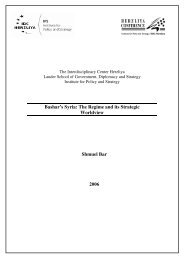Iran: Cultural Values, Self images and Negotiation Behavior
Iran: Cultural Values, Self images and Negotiation Behavior
Iran: Cultural Values, Self images and Negotiation Behavior
Create successful ePaper yourself
Turn your PDF publications into a flip-book with our unique Google optimized e-Paper software.
<strong>Iran</strong>: <strong>Cultural</strong> <strong>Values</strong>, <strong>Self</strong>-<strong>images</strong> <strong>and</strong> Negotiating <strong>Behavior</strong>consuming; the initial refusal to accept a proposal must be repeated enough tounderline the fact that the recipient knows that he is unworthy, but accepts out ofdeference. When an <strong>Iran</strong>ian wishes to stress his sincerity, he will say tœ'arof nist. Thisis not to be confused with tœ'arof.<strong>Iran</strong>ians do not practice tœ'arof on foreigners (who do not know the rules), <strong>and</strong>they do not expect foreigners to practice esoteric <strong>Iran</strong>ian customs. It may even be saidthat <strong>Iran</strong>ians feel a certain discomfort in the face of attempts by foreigners to obey<strong>Iran</strong>ian etiquette mores. <strong>Iran</strong>ians, however, are extremely <strong>and</strong> genuinely hospitable toforeigners. Like many other cultural traits, this too seems to contradict the stigma ofstinginess or frugality often attached to <strong>Iran</strong>ians.<strong>Iran</strong>ians have a strong feeling of representing their culture vis-à-vis foreigners. Asa rule, they maintain a façade of politeness even under tension. Most accounts ofdifficult negotiations are in agreement that the <strong>Iran</strong>ian side seemed to pride itself onnot “loosing their cool,” <strong>and</strong> on maintaining political correctness <strong>and</strong> etiquette.One custom, unique to Shiite Islam, is the belief in ritual unclean-ness (najjes –nejasat). According to this tenet of Shiite faith, a believer (i.e., Shiite) who touches aheretic (Christian, Jew, pagan) becomes impure <strong>and</strong> must purify himself. Thisprecept, if observed conscientiously, precludes physical contact with heretics – anobvious obstacle to normal interaction. The manner in which <strong>Iran</strong>ians, includingscrupulously religious ones, circumvent this tenet is indicative of the predominance ofpragmatic politics over religious principles.Emotionalism<strong>Iran</strong>ian culture allows for expression of extreme emotions – in particular feelingsof insult, rage, <strong>and</strong> personal umbrage. Some observers rightly distinguish betweenspontaneous <strong>and</strong> unbridled expression of feelings, <strong>and</strong> socially appropriate publicdemonstration of emotion – particularly anger. The former is not a typical <strong>Iran</strong>ian trait(as can be seen at <strong>Iran</strong>ian funerals), whereas the latter is a social device or accountingprocedure, which relays to the surroundings a message of emotion. 132 The goal of thelatter is pragmatic; it declares to the target audience that the individual is hurt,insulted, <strong>and</strong> angry, <strong>and</strong> that he must be appeased. Sophisticated use of emotionaloutbreaks is highly regarded as cleverness.In the course of official talks – be they political or business – it is rare that therelationship reaches a level of camaraderie that allows for humoristic exchanges. It isnot politically correct for <strong>Iran</strong>ians to malign themselves by telling foreigners jokesabout <strong>Iran</strong>ian frailties, <strong>and</strong> their strong sense of etiquette does not allow for exchangesof jokes.132 See Beeman, “What is (<strong>Iran</strong>ian) National Character?”36
















